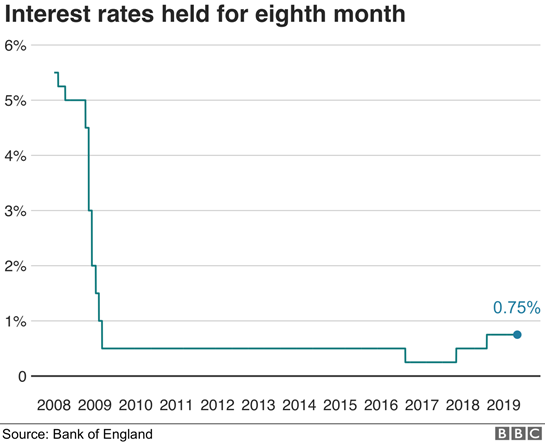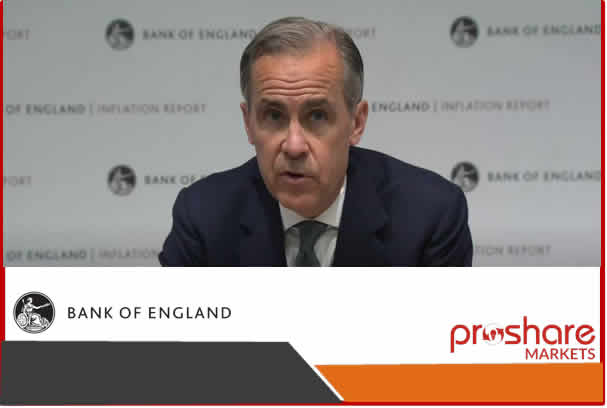Thursday, May 02, 2019 / 03:25PM / By Bank of England with news reports from BBC / Header Image Credit: BoE
Highlights
- The UK economy isgrowing but not quickly
- Inflation is close toour 2% target
- Future interest raterises should be gradual and limited
- Whatever form Brexittakes, we will keep inflation low and support the economy
Interest rate increases could be "more frequent"than expected if the economy performs as the Bank of England is expecting,governor Mark Carney says.
The markets before today were forecasting just oneinterest rate increase by 2021. But if there is a resolution to the Brexitimpasse, and inflation and growth continue to pick-up, then more increases arelikely, Mr Carney said.
As expected, the Bank kept interest rates on hold at0.75% at its latest policy meeting.
Interest rates have been at that level since lastAugust, when the Bank raised them by a quarter of a percentage point.
The Bank is expecting growth and inflation to pick upover the next two years.
In a news conference, Mr Carney said: "Ifsomething broadly like this forecast comes to pass... it will require interestrate increases over that period and it will require more, and more frequentinterest rate increases, than the market currently expects."
The Bank's forecasts are based on a "smoothadjustment" to any new trading relationship with the European Union.

What did the Bank say about the economy?
Inits Quarterly Inflation Report, the Bank of England raised its UKgrowth forecast for this year, in part because the outlook for the globaleconomy is a bit brighter.
The Bank now sees growth of 1.5%this year, up from February's forecast of 1.2%.
Economic growth has been subduedsince the UK voted in June 2016 to leave the EU.
In particular, business investmenthas been falling.
The Bank says stockpiling has beengiving the economy a short-term boost, but for this year, the strengthening ofthe global economy will have a more important effect.
Inthe minutes from its latest policy meeting, the Bank said "globalgrowth had shown signs of stabilisation, and had been a little better thanexpected".
It also forecasts the unemploymentrate will continue falling in the coming years to 3.5% by 2022, which would bethe lowest rate since 1973.
INFLATION REPORT PRESS CONFERENCE
OpeningRemarks by the Governor
Introduction
Backin February, the MPC observed that the Fog of Brexit was creating a series oftensions for UK businesses, households and financial markets, and that this wasoccurring against a backdrop of considerable trade and financial pressures inthe global economy.
Atthat time, the short-term outlook for the UK economy was subdued, and the datawere expected to be unusually volatile and potentially less informative thannormal. But provided clarity emerged about the future relationship with the EUand the worst of the global risks were avoided, the MPC expected that UK growthwould pick up to above potential rates, domestic inflationary pressures wouldbuild gradually and a modest ongoing withdrawal of monetary stimulus would berequired to keep inflation sustainably at target over the policy horizon.
Sowhat has changed since then?
GlobalOutlook
Inrecent months, global tensions have eased.
Inparticular, there has been a further marked easing in global financialconditions triggered by revisions to the monetary policy outlooks in majoreconomies. In tandem, global risk sentiment has recovered. This has spilledover to lower yields and to ease financial conditions in the UK.
Therehave also been signs that global trade is stabilising and trade tensions, fornow at least, have abated somewhat.
Partlyas a result, activity appears to be stabilising in the major economies. Thehard data now suggest that global growth troughed towards the end of last year,and the survey data bottomed out shortly thereafter. Recent developments areconsistent with the MPC’s expectations for a modest pickup in global growthover the course of this year to around potential rates.
UKEconomy: Past as Prologue?
Incontrast to this more benign global backdrop, domestic tensions remain.
Toget a sense of their consequences, it is helpful to review the how the UKeconomy has performed relative to MPC’s forecast from February last year.
OverallGDP growth appears bang in line with our forecast. However, its expenditurecomponents are substantially different, with the expected rotation fromconsumption towards business investment and net exports failing to materialise.
Instead,higher employment and stronger wage growth meant that household consumption wasstronger than anticipated, growing by 2% versus 1½% expected.
Offsettingthat positive news, business investment fell by more than 2% rather thangrowing by 4%. And net trade subtracted ½ a percentage point from the expansioninstead of contributing ¾ of a percentage point to growth.
Businesses
Thispattern looks set to continue in the near term.
Thelatest business investment intentions surveys point to further declines overthe next few quarters, which would mark the longest run of falling investmentin the post-war era.
Fallinginvestment is weighing on productivity growth, boosting unit labour costs, andsupporting domestically generated inflation.
Unableto plan for their long-term future, UK businesses have focused on short-termBrexit contingency plans.
Concernedabout disruptions to trade given the potential 29th March cliff edge, companieson both sides of the Channel brought forward production, pushing UK goodsimports and exports with the EU to decade highs in the three months to Februarydespite the doldrums in both economies.
Accordingto our Agents’ surveys, the proportion of UK firms with contingency plans inplace has risen from around one half in February to over three quarters atpresent.
Stockbuilding has been central to the plans of over two-fifths of surveyrespondents, boosting GDP in the first quarter.
Nevertheless,it remains the case that companies are only as ready as they can be, and theyexpect a marked decline in the rate of growth, investment and employment in theevent of a hard Brexit. In recent surveys, firms expected their output wouldfall by 3½% in the event of a no deal no transition Brexit.
Facedwith a high option value of waiting for news about Brexit, companies inaggregate appear to have favoured hiring relative to capital investment.
Asa result, the UK labour market has outperformed expectations over the pastyear, with employment and wage growth both surprising on the upside. Theresulting strength in real income growth has supported consumption, which inturn has driven domestic demand.
Households
Four-quarterreal income growth picked up further in the first quarter, and surveys of consumerconfidence indicate that households remain relatively optimistic about theirown financial prospects, despite being pessimistic about the overall economicsituation.
Thatdivergence may be the reason why the only area of household spending discerniblyrestrained by Brexit is the housing market, where transactions are currentlysubdued and prices stagnating.
Inaggregate, Q1 GDP growth is projected to come in 0.3pp stronger than expectedin the February Report.
Aroundhalf of that upside surprise could be due to the boost from Brexit-relatedstock building. Consistent with reports from the Bank’s Agents, the MPC expectsa corresponding drag to growth in Q2.
Smoothingthrough this volatility, the underlying pace of growth is a touch stronger thanthe MPC had previously assessed, though it is still a little below potential,meaning that the current margin of slack in the economy is expected to widen alittle in coming quarters.
FinancialMarkets
WhileUK financial markets remain sensitive to Brexit-related news, globaldevelopments appear to have driven down the market curve for Bank Rate thatunderlies the MPC’s projections.
Expectationsof policy rates in the US and euro area have fallen significantly since theFebruary Report and market expectations for the path of Bank Rate havefollowed. That path currently implies that Bank Rate will rise to around 1% bythe end of the forecast period, around 15 basis points lower than in theFebruary Report.
Asthe MPC’s inflation forecast suggests, this new market curve introduces anadditional financial market tension to the one already existing between thecurrent level of sterling and the level that would be consistent with whateverBrexit outcome that ultimately comes to pass.
TheEconomic Outlook
Atsome point, the tensions between households, companies and financial marketswill be reconciled.
Inthe MPC’s projections, that resolution comes through our assumption of a smoothBrexit, resulting in a forecast of two phases.
Inthe first phase over the next year:
- Growth remains modest,reflecting the continued drag from Brexit uncertainties and below-potentialglobal growth.
- Near-term inflation isexpected to pop above 2% in April and then fall back below target, in largepart reflecting movements in household energy prices and still modest coreservices inflation.
- In the second phase overthe balance of the forecast, as global growth stabilises around potential ratesand Brexit uncertainties wane:
- Business investmentgrowth recovers, the housing market improves, consumption continues to growbroadly in line with incomes, and aggregate demand picks up to above potentialrates.
- Excess demand risesslightly above 1% by the end of the forecast period, notably higher than inFebruary, with the unemployment rate projected to decline to 3½%.
Theemergence of excess demand leads to a strengthening of domestic inflationarypressures, more than offsetting the fading contribution from import and energyprices, such that inflation rises above target in two years’ time and continuesrising through the end of the three-year forecast period.
Implicationsfor Policy
Atits meeting yesterday, the MPC agreed that the current stance of policyremained appropriate.
TheCommittee emphasised that the right path for monetary policy will depend on howthe current tensions between businesses, households and financial markets areresolved. The response of monetary policy to Brexit will depend on the balanceof its effects on supply, demand and the exchange rate.
TheMPC’s latest projections imply that the current market curve used as theconditioning assumption for our forecast is unequal to the task of achievingthe MPC’s remit.
Basedon the MPC’s conditioning assumption of a smooth Brexit, the Committeecontinues to judge that an ongoing tightening of monetary policy over theforecast period, at a gradual pace and to a limited extent, would be appropriateto return inflation sustainably to the 2% target at a conventional horizon.
Related Reports Published on 02 May 2019
· Download the Inflation Report
· Monetary Policy Summary and minutes
· Chartslides and data - ZIP file (8.1MB)
Related News
1. Nigeria's50bp Rate Cut is Insufficient to Boost Lending – Fitch
2. GrowingRisks to Central Bank Independence
3. ImplicationsOf The MPC Rate Cut Decision On The Economy; Expectation Of Further Rate Cuts -FDC
4. CBNMoves MPR After 33 Months - A Dollar Short and An Hour Late ?
5. MonetaryPolicy: MPC Springs A Dovish Surprise
6. ToughEconomic Lessons From Ghana
7. ChancellorOf The Exchequer Launches Search For Next Governor Of The Bank of England
8. Banksin AAA Jurisdictions Face Rising Household Debt Risk
9. China'sBig Four Banks Dominate The Top of The World’s 100 Largest Banks
10. SouthAfrica’s Credit Rating Postponement: A breather?
11. Brexit– The European Council (Art. 50) Conclusions, 21 March 2019
12. BankRate Maintained at 0.75% - March 2019 – Bank of England
13. FederalReserve Issues FOMC Statement – Mar 2019
14. NewFinancial Report: Brexit and The City – The Impact So Far
15. AnOpen Letter to Theresa May by Ahmed Sule, CFA
16. GlobalTrade Growth Slows Down To 3.3% In 2018
17. MinutesOf The Federal Open Market Committee, January 29-30, 2019 - Key Takeaways
18. Eurozone2019 Growth Forecast Cut to 1%; ECB Could Restart QE
19. Open-EndedBond Funds a Potential Risk to Financial Stability - Fitch
 Lagos, NG • GMT +1
Lagos, NG • GMT +1











 4292 views
4292 views









 Sponsored Ad
Sponsored Ad
 Advertise with Us
Advertise with Us









